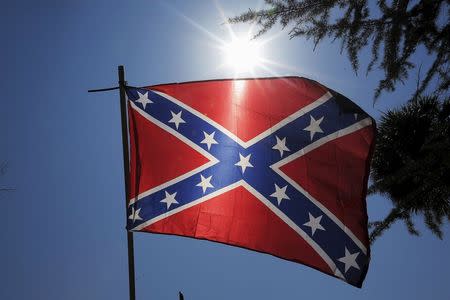 Daily Brew
Daily BrewCriticism of Confederate flag spurs human rights complaint in Canada

Canadian news coverage of the debate over the Confederate flag in the United States constitutes discrimination, a Saskatchewan man says.
Dale Pippin says he’s filed a complaint with the provincial human rights commission over media coverage.
“While the U.S. media seems able to routinely trash the Confederate flag, I thought I’d see if we are able to get away with it here in Canada,” Pippin wrote on his blog, SouthSaskSoutherner.
He says he filed the complaint on July 1. The Saskatchewan Human Rights Commission does not comment on complaints and cannot confirm if Pippin’s complaint has been received.
Citing CTV News specifically and other media in general, Pippin says coverage has been degrading and discriminatory toward today’s southerners, which he counts himself among.
Pippin says his family moved to Saskatchewan 110 years ago from Tarboro, N.C. His ancestors fought for the Confederacy in the American Civil War.
“I was under the impression that we are in a free country. In this free country we call Canada we ensure that the lineage and history of minorities is protected and not discriminated against,” he writes in the complaint he posted on his blog.
“The media needs to be held accountable and held to some sort of responsible standards of reporting,” writes Pippin, who did not immediately respond to a request for an interview. “There should be extensive public apology in the paper, on the radio, and the television. The disinformation now needs to be corrected by the source of the exaggerated propaganda.”
There has been a long-simmering debate over the “stars and bars” as a symbol of slavery and hate in the American South.
The issue came to a boil after photos surfaced of the flag in the hands of Dylann Roof, the man charged in the murders of nine people at a church in Charleston, S.C. The photo appears on a website with a racist manifesto.
Following the massacre, South Carolina legislators voted to remove the flag from the statehouse. Alabama’s governor followed suit.
Pippin, who claims to be a former member of the Canadian Civil Liberties Association, points out in his complaint that he was unable to purchase Confederate flags at The Flag Shop in Saskatoon.
But if he considers that discrimination, the shop owner does not.
Judy Denham says the flag has been removed from franchise shelves across the country and reaction in her store has been overwhelmingly positive.
When the stars and bars came down in South Carolina it made her realize the connotations, Denham tells Yahoo Canada News.
“Why did we sell it up to that point? Because of my ignorance,” she says. “Because I didn’t do my homework and understand what that flag was all about.”
She is baffled at the backlash north of the border.
“We’re in Canada. Why has it become an issue?” she says. “If you’re Canadian, why are you not more concerned about your Canadian history?”
The so-called Dixie flag seems to be viewed here as a symbol of a rural, rebellious culture.
After all, it adorned the General Lee, driven by Bo and Luke Duke in the 1980s sitcom “The Dukes of Hazard.” There is even a social media meme appealing to users to “save the General Lee.”
Two years ago the Sutton District High School in Ontario had to ban Confederate symbols being sported by students.
Launching a human rights complaint does not mean the complaint has merit says professor Karen Busby, director of the Centre for Human Rights Research at the University of Manitoba.
Saskatchewan’s human rights code does have a rare provision concerning publication but the Supreme Court of Canada has ruled that causing ridicule does not constitute a violation.
“It it’s intended to facilitate conversation then it’s protected” by the Charter, she says.
Pippin says he may organize Confederate flag marches, depending on the reaction to his stance. Judging by comments on the blog, there may not be any parades any time soon.
“Please, you’re being very embarrassing with this human rights complaint,” says one reader. “Fly your flag if you must but don’t try to frame this as an issue about discrimination. The flag has deep-rooted connotations and frankly, as white Canadians who never suffered under that flag, we have no right to try to change people’s viewpoints.”
Another writes: “Don’t attempt to tie up our courts with drivel. You’re embarrassing yourself, our province and our country.”


